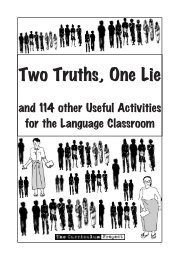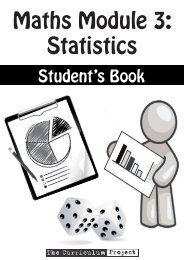Teacher's Guide - The Curriculum Project
Teacher's Guide - The Curriculum Project
Teacher's Guide - The Curriculum Project
- No tags were found...
Create successful ePaper yourself
Turn your PDF publications into a flip-book with our unique Google optimized e-Paper software.
18. Economic GlobalisationBrainstorm1. Ask students what they think the words ‘economic globalisation’ mean.Write their ideas down on the board.Pre-teach: unification (noun): joining together.Ask students to read the first paragraph about economic globalisation.Pairwork2. Put the students into pairs. Ask them to look at the items around them inthe classroom and/or in the community (depending on what you have inthe classroom and how much time you have). Is there a label on any ofthese things to say where they are made (e.g. ‘Made in China)? If so, askthem to write the item down in their notebooks, including the informationabout where it was made. <strong>The</strong>n ask each pair to present their lists quickly tothe class. How many different countries do the things they found come from?Pre-teach:auction (noun): a sale of property to the person who pays the most money; to bid (verb): offera price for something; bidder (noun): a person who bids in an auction.Ask students to read the text about eBay: an internet miracle. Ask them towrite down any words that they don’t know. Elicit these words in turn. Ask ifthey, or other students can guess the meaning (give them some clues ifnecessary). If not, give them a dictionary to look it up and tell the class, or tellthem yourself.Pairwork3. True or false. Write the following statements (but not the answers!) on theboard. Put students into pairs. Give them about 10-15 minutes to decidewhether these statements are true or false. If false, they must give the correctstatement. When they have finished, elicit answers from pairs in turn andcheck agreement with the rest of the class.1. eBay helps people to buy and sell things on the internet.Answer: True.2. eBay makes money by selling goods.Answer: False. eBay makes money by asking sellers to pay a small amount of money toplace their advertisements, and also by taking a small percentage of the amount for whichthe item was sold.3. eBay only sells toys and sports equipment.Answer: False. <strong>The</strong> company sells many different things.4. In 2007, almost US$60billion of goods were sold through eBay websites.Answer: True5. Today eBay only does business in the USA.Answer: False. eBay operates websites in more than 30 countries.<strong>The</strong> <strong>Curriculum</strong> <strong>Project</strong> ECONOMICS: an introduction - Teacher’s <strong>Guide</strong>66













![[Eng] Nov 2012 DRAFT - The Curriculum Project](https://img.yumpu.com/45590859/1/184x260/eng-nov-2012-draft-the-curriculum-project.jpg?quality=85)


